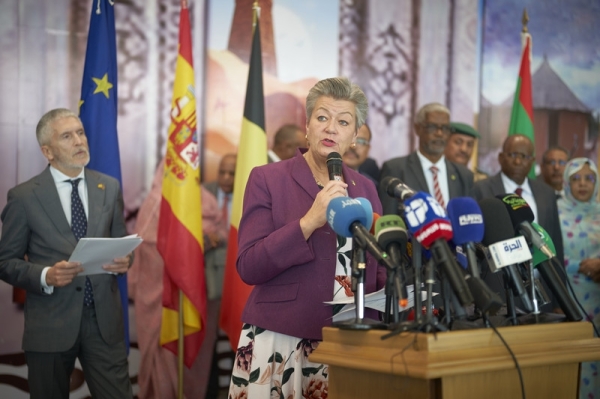EU softens rhetoric: ‘Cash-for-migrants’ to ‘economic lifelines’
This time last year EU leaders were ready to do whatever it takes to ramp up action on migration control and repatriation.
Following last February’s EU summit where leaders agreed to threaten to suspend aid, tariff-free trade and visa access to countries that refuse to take back failed asylum seekers, further details were set out in a letter to leaders from European Commission president Ursula von der Leyen.
The letter stated that "the commission is working closely with member states to intensify cooperation with key partners in north Africa", adding that "as part of our programming of EU funds this year we will once again give priority to this work, with a particular focus on Tunisia and Egypt."
One year on and two agreements — with Tunisia and Mauritania — have been finalised, and a third — with Egypt — is close to completion. Von der Leyen’s EU executive is no less determined to cut deals that get north African countries to assist the EU in curbing migration flows.
But the threatening rhetoric is gone. Just don’t call them ‘cash for migrant control’ pacts.
The main value of these arrangements to the EU is certainly migration control but from a public relations perspective they are not being marketed so crudely, and the funding they offer is very important, particularly to Tunisia and Mauritania.
In recent months, the commission has focused more on the economic components of the deals, marketing the agreement with Tunisia, in particular, through the prism of economic support. On Monday (4 March), the European Commission paid out €150m in vitally needed budget support to president Kais Saïed’s government.
"The budget support programme is supporting Tunisia in bringing forward important reforms with the overall aim of improving the socio-economic situation in the country," a commission spokesperson told EUobserver.
The spokesperson added that the €150m was designed "to accompany reforms contributing to macro-economic stability in Tunisia."
"The objective of the programme is to support the efforts made by the Tunisian government to improve the socio-economy situation of the country, in particular by improving the management of public finances as well as the business and investment climate," the spokesperson said.
The significance of the EU’s support for Tunisia cannot be understated. Although Saïed’s government entered talks with the International Monetary Fund with a view to finalising a $1.9bn [€1.74bn] loan, these collapsed after Saïed rejected the terms offered by the Fund as "dikdats".
With a credit rating of CCC-, Tunisia has effectively been locked out of the international financial markets, which prompted the Saied government to push through a bill allowing the central bank to provide billions of dollars in direct budget support to the treasury.
The partnership on migration with Mauritania which was signed by EU home affairs commissioner Ylva Johansson on Thursday (7 March) includes economic support, while talks on a ‘Strategic Partnership’ with Egypt are also expected to feature funding for the Egyptian economy.
While Egypt is less dependent on EU money, analysts say that its willingness to co-operate with Brussels offers encouragement to the IMF and World Bank. Indeed, Abdel Fattah el Sisi’s government this week agreed terms with the IMF to increase its loan arrangement with the Fund from $3bn [€2.74bn] to $8bn after the Egyptian central bank said it would let its pound currency trade freely and hiked interest-rate by 600 basis points in a bid to stabilise the economy. The IMF cash is vital to el Sisi’s government and to the president himself, who has been under pressure from the Egyptian military to address the country’s economic difficulties.
The agreement with Egypt had been expected to be concluded early this year, and president von der Leyen is due to travel to Cairo next week with Belgian premier Alexander de Croo.
Similarly, last December, the IMF agreed terms to extend its loan facilities to Mauritania albeit for a much smaller total amount of $280m. Most of the IMF money — $258m — is intended to finance climate resilience projects and clean energy projects. The €210m EU programme includes investment in green hydrogen.
At the EU-Egypt Association Council, in January, the EU and Egypt made clear that "in view of the importance they attach to their relationship, the EU and Egypt intend to elevate it to the level of a Comprehensive and Strategic Partnership".
Leaving aside the stilted euro-jargon, the message is that it is about more than just migration.

